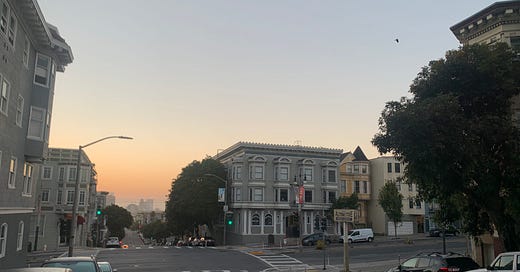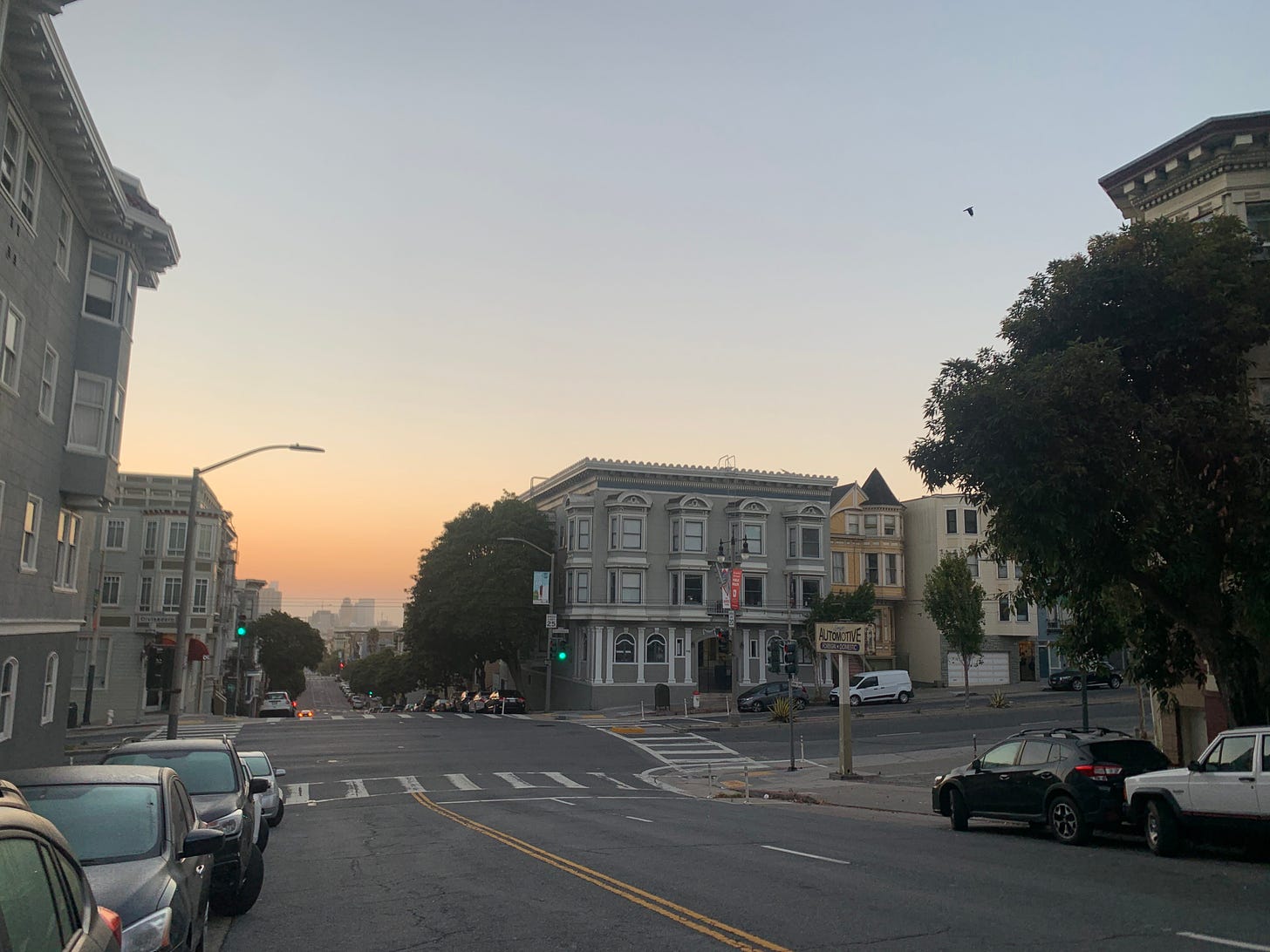Every December, I sit down to write a note on how the year went. They used to read like something halfway between a Medium listicle and a brag sheet: 50 books read, 14 courses taken, 4 continents hit. I felt a lot of pride about being the kind of person who couldn’t pick a major, refused to line up a job, and was always on the cusp of starting a big new project.
I can’t write that kind of post for 2022: it’d be exceptionally boring. When friends ask what’s new, I say not much, and I mean it. Most of my active waking hours go toward Substack (two years strong), Reboot (nearly on year three), or hanging out with the same people I’ve known since middle school, high school, and college. I moved from New York to San Francisco in August, but have mostly stayed put since—it’s the first in possibly five years that I haven’t left the United States. I’ve even managed to avoid picking up any new Bay Area hobbies—no climbing, woodworking, or 5am hikes.
Sometimes I worry that I’m settling too early, but that framing feels unfairly passive. Perhaps growing up means choosing the same thing over and over again. I’m free, boring, and happy right now—and isn’t that enough?
My media consumption has followed the same unadventurous patterns as my life has. This year, I read three books by Maggie Nelson (On Freedom, Bluets, The Art of Cruelty), three by Michel Houellebecq (Submission, Whatever, The Elementary Particles), my third Sally Rooney novel (Beautiful World, Where Are You), my third Susan Sontag collection (Against Interpretation and Other Essays), plus a salacious 800-page biography of her life and work (Sontag by Benjamin Moser). I’ve started watching films in threes, too: Charlie Kaufman (Eternal Sunshine, Adaptation, Being John Malkovich), Paul Thomas Anderson (Phantom Thread, Licorice Pizza, Magnolia), and to round out the year, the decades-spanning Before trilogy from Richard Linklater.
Sometimes, repetition emerges from desire, the feeling of I need to binge everything this person has ever made. But more often than not, it stems from curiosity and familiarity—not with the object, but with its maker. The more you read an author, the more you feel you know them, their perspective, the themes that fascinate them, the traditions that drive them, the linguistic crutches they like to lean on. It’s like falling in love: the way you start adopting someone else’s mental models as your own, all their tics and quirks and tiny brilliances. Maggie Nelson analyzes art because it refuses moral black-and-whites. She’s always balancing on the fence. Michael Sandel excels at translating philosophy for the masses, but falters the closer he gets to ground reality. Darren Aronofsky is obsessed with obsession and sometimes stylish to a fault. And the more people you fall in love with, the more lenses you’ll have to see the world through.
But it’s not just writers and thinkers and artists I’m talking about. I saved a TikTok of a girl explaining her concept of the “fatal flaw.” I think it’s genius. It goes like this: every close friend gets one fatal flaw. Maybe they’re always late, maybe they can’t keep secrets, maybe they ghost every guy they meet. The rule is that you can’t hold that thing against them. If it’s intolerably serious, you stop being friends, but otherwise, you forgive and accept. I love this idea because it reflects how I believe people really are—a mostly stable package of good and bad that you can buy wholesale, or not at all. I have another working theory that you know you love someone when each new weakness uncovered no longer changes how you feel. Time and trust can turn any blemish into a beauty mark. It’s then that knowing and loving are not so far apart.
This approach rejects the cult of consumer churn: fuck dating apps that encourage you to shop (and drop) partners like trying on clothes, fuck treating places to live like baskets of amenities you can nomad through, fuck choosing your favorite coffeeshop based on 5-star Yelp reviews instead of wherever you had your first breakup or job offer or college acceptance, year after year after tedious year. It’s an antidote to the dumbest forms of cancel culture: the idea that people are irredeemable after they made a gay joke in sixth grade, or that there’s some universal rubric of icks that all women should watch for, lest they tragically end up with a toxic, genetically modified, pesticide-laden man. Perhaps Gen Z is less into cancel culture than our millennial forebears just because we’re sick of having to denounce every fave we’ve ever loved. Kill all your heroes, and you’re left with none.
An orientation against disposability has to start with the self. Patience, endurance, grace, and conviction. One of my worst takes is that the rise of the “growth mindset” is a curse. It’s not that I don’t want to get better at stuff—I relish challenge and improvement, I really do. But I find growth mindset hard to sit with in the same way I find effective altruism hard to sit with, which is that both creeds can easily morph into a relentless, uncritical quest for self-optimization over self-esteem. What Instagram influencers do for body image, growth mindset does for skills, and effective altruism for morality. Most people will never be size 0s, perfect polymaths, or commit their lives to charity. I like spikiness: I’d rather double down on what I know I love than constantly remake myself chasing the mirage of positive EV. But you could be more, you could be better, why don’t you live a different way?
During undergrad, this sort of anxiety was a core feature of my day-to-day experience. Decisions paralyzed me: study or party, take this job or that, even trivial things like dining halls and clothes and clubs. Every choice felt like a confrontation between the part of myself that knew what I wanted and an idealized image of how college life ought to be lived. My peers at Stanford seemed to have it all, but I couldn’t see past the endless tradeoffs and impossible calculations. But a few years out now, I realized that these days I don’t feel very anxious at all. I think it’s because I’ve finally learned to put away that ideal—to replace the words I should with I am when I can. I like to stay in on Friday nights and spend Saturdays out. I work late because I want to. I prefer eating most meals alone. I find dating apps mind-numbing and keep getting entangled with friends. I’m bad with numbers and directions. I see my goals in tunnel vision. I have a terrible poker face—I can’t hide my emotions. I’m idealistic. I don’t text back. I go crazy when I’m not in the middle of a book.
I’m under no illusion that these truths will last forever. My prefrontal cortex still has a year or so to stretch—quarter-life crisis, come what may! But right now, I’m finding a lot of contentment in doing the same things over and over, better and better, more and more. I run my own races, hold close what I have, pick one battle at a time to fight and to win. I know myself now, which feels as close to self-love as I’ll ever get.
🌱 quick life updates
I moved to San Francisco in August—specifically NoPa, a cute neighborhood conveniently sandwiched between Alamo Square and Golden Gate Park. I really like it here. Let’s get coffee and catch up?
Reboot published the second issue of Kernel, our annual print magazine.1 This year’s is just as gorgeous and even more ambitious, including essays, reporting, interviews, fiction, poetry, and visual art on topics from open source to ecology to crypto to criminal (in)justice. I also joined the Omidyar Network’s “The Tech We Want” effort as a Luminary, and have learned a ton.
At Substack, I'm now a product manager on our fledgling Writer Growth team. I feel both excited and anxious, and am realizing that the business books I looked down on people for reading in college can be quite useful when you have real work to apply them to.2 I also helped launch a feature to give every newsletter a group chat—in ours, I share semi-regular “here’s what content I’ve been consuming,” so get the app to join.
I once again failed my Goodreads Reading Challenge. Still, the best things I read were On Freedom by Maggie Nelson, Sontag by Benjamin Moser, Direct Action by David Graeber, and Tomorrow & Tomorrow & Tomorrow by Gabrielle Zevin. Some essays that stuck with me covered the narrowing of civic life, the Whitney biennial, performing ethnic credibility, art as technology, and idea machines. I also started watching movies and made a Letterboxd to track them.
As usual, I’d love to hear what’s going on for you. Maybe one new thing, and one thing that’s stayed the same for 2022. Feel free to hit reply on this email or leave a comment.
— jasmine
Start a newsletter to help me hit my Q1 goals 🙏





Loved this! When you write “I have another working theory that you know you love someone when each new weakness uncovered no longer changes how you feel about them,” I’m reminded of a great quip from my favorite author to the effect of: it means nothing to me when someone tells me they love me because I’m handsome, or smart, or because I make them happy; everyone loves those things. It means something to me when my wife says she loves me even though I’m stupid, ugly, and make her miserable. That’s love, that means she sees me clearly and loves me anyway, that’s real, etc.
That always cracked me up but also feels sort of true.
This really touched on a lot of experiences I remember going through in college (and still today, to some extent)! I still recall and occasionally experience the momentary crises of, "But I'm not good enough at my hobbies, and I've got so much time where I'm just indulging in sameness rather than expanding my mind!" Some of it was driven by the people I chose to surround myself with, some of it was the culture I found myself in, but one thing for sure is that it was exceedingly detrimental to my mental well-being and doubly so during the pandemic. We don't all need to excel all the time, always.
And, unrelatedly, "or that there’s some universal rubric of icks that all women should watch for, lest they tragically end up with a toxic, genetically modified, pesticide-laden man" was excellent and cracked me up.